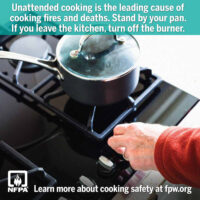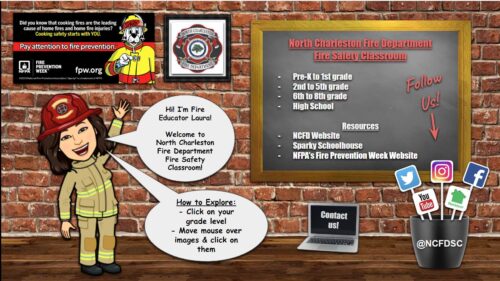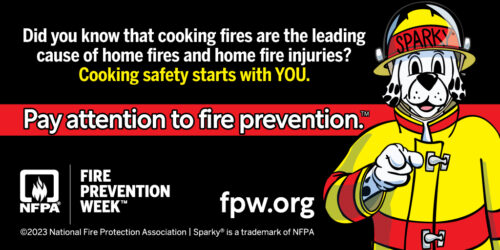This year’s Fire Prevention Week™ (FPW™) campaign, “Cooking safety starts with YOU. Pay attention to fire prevention™,” works to educate everyone about simple but important actions they can take to keep themselves and those around them safe when cooking.
Cooking Safety
Did you know? Cooking fires are the leading cause of home fires and home fire injuries. Unattended cooking is the leading cause of cooking fires and deaths.
What can you do? The good news is you can prevent most cooking fires and burns. Help keep your family safer with some simple but effective tips.
Smoke alarms
Smoke alarms sense smoke well before you can, alerting you to danger. Smoke alarms need to be in every bedroom, outside of the sleeping areas (like a hallway), and on each level (including the basement) of your home. Do not put smoke alarms in your kitchen or bathrooms.
Choose an alarm that is listed with a testing laboratory, meaning it has met certain standards for protection.
For the best protection, use combination smoke and carbon monoxide alarms that are interconnected throughout the home. These can be installed by a qualified electrician, so that when one sounds, they all sound. This ensures you can hear the alarm no matter where in your home the alarm originates.
Fire Safety Fest 2023
We are inviting our community to enjoy apparatus displays from multiple agencies, a children’s section, educational booths, live demonstrations, free admission to the fire museum, food trucks, and great entertainment!
Helpful Links

NCFD Bitmoji Classroom
Explore the world of fire safety via our Bitmoji Classroom on Google Slides. Each slide is designed for certain grade levels.
About Fire Prevention Week
Since 1922, the NFPA has sponsored the public observance of Fire Prevention Week. In 1925, President Calvin Coolidge proclaimed Fire Prevention Week a national observance, making it the longest-running public health observance in our country. During Fire Prevention Week, children, adults, and teachers learn how to stay safe in case of a fire. Firefighters provide lifesaving public education in an effort to drastically decrease casualties caused by fires.
Fire Prevention Week is observed each year during the week of October 9th in commemoration of the Great Chicago Fire, which began on October 8, 1871, and caused devastating damage. This horrific conflagration killed more than 250 people, left 100,000 homeless, destroyed more than 17,400 structures, and burned more than 2,000 acres of land.

